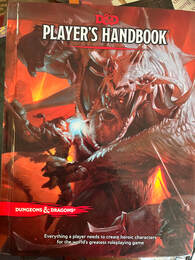 The problem with Dungeons and Dragons, as much as people love it, is that it is totally "The Man." TSR, the original publisher was dysfunctional...but the Man. Wizards of the Coast (WoTC)--maker of the Magic the Gathering card game and purchaser of TSR's corpse--is also the Man. Hasbro, who bought WoTC pretty obviously is the Man as well. Yes, they all like games, but the culture of these institutions have been geared toward squeezing the last dollar out of consumers for a long, long time. Now there is unrest among the tabletop gamers. Hasbro/WoTC is testing out a new license for third party producers who use what they feel is Hasbro/WoTC's own intellectual property. Set aside for a minute that this gaming giant picked through other companies' work for many of the tropes they use. Also ignore for a moment that much of what they claim as theirs is derived from myth, legend, and fantasy novels written by people who may have never heard of D&D. Even, for a moment, pretend not to know that WoTC/Hasbro actively encouraged people to write for their game by promising specifically not to do what they are now trying to do; namely monetizing these 3rd party creators' ideas and labor as if it was their own. All of that aside, it still seems strange that anybody could claim to have originated rolling dice and adding numbers, doesn't it? Now, the Man is in temporary retreat, claiming to be misunderstood. They weren't misunderstood. They were just surprised by the pushback. It is in their DNA to take the rest of the gaming community for granted. For further research into this somewhat tedious but very important subject, you can check out any number of stories about the Open Gaming License. Even the mainstream press has noticed. I will cease to belabor the issue here, except to say that there are other fish in the gaming sea. One thing that the Man has done is accidentally energize all those folks who they hoped would fall into line. We are, I think, about to enter a renaissance of gaming opportunities. Don't worry about the Man, by the way. they will be fine. D&D is neither the first nor the best game of its kind. In fact, the current version of the game--called "5th Edition" although there have been many more editions than 5--is not the game that they started with. Yes, Virginia, those kids on Stranger Things are playing a very different game. More on that later. Why will WoTC be fine? Their brand name is ubiquitous, so people just entering the hobby won't even know there are other options. I run games in "D&D 5e" because I work with new players and saying "it is like D&D but it is not D&D" is a non-starter for many. If someone decides they want to drink cola for the first time they ask for a Coke. You can tell them that Polar Cola is better but they will not believe you until after their Coke experience. That is D&D. It is Coke. History, culture, and a good ol' dollop of corporate gaslighting have convinced us that Coke and D&D are the best. Of course, the truth is a ton more complicated. Anyway, the church campaign may be the last one I play using a Hasbro product. I play a great many roleplaying games (RPG's) right now and none of the others are D&D. Interestingly I refer to the groups I play with as "D&D groups" because then people know what I am talking about...but we are playing Polar Soda--metaphorically--and loving it. So if you are a tabletop gamer, or interested in becoming one and want to fight the Man, here are five games that are better than D&D. 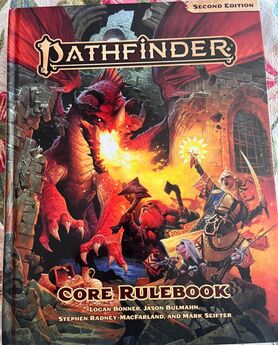 This is built on many of the same core mechanics and by many of the same people as D&D. This is built on many of the same core mechanics and by many of the same people as D&D. Pathfinder Second Edition: This is the true Polar Soda of the gaming world. It is made by Paizo, an independently-owned company that split off the last time WoTC/Hasbro betrayed the public trust in what nerds call "The Edition Wars." The wars--in some sense--are still ongoing...and complicated. Basically, Pathfinder First Edition was very similar to D&D 3.5 Edition. Confused yet? The developers at Paizo had a major hand in developing that system. When WoTC went to D&D 4e, Paizo decided to continue with the previous game. The fallout from that split is part of the reason there is an OGL in the first place. You see, Pathfinder 2e is really as much the inheritor of D&D as D&D 5e. This is a basic truth in the gaming world. It is the elephant in the room over at Hasbro. I should note that when I returned to gaming about twenty years ago I first told myself it was for the kids. Then I settled on D&D 3.5/Pathfinder 1 as my re-entry point. I was one of those people who migrated to Paizo then. The system was super complicated...but there are at least some good memories! Having grown directly out of the split, Pathfinder 2e is built on a very similar platform as D&D. They are cousins, essentially. If you are looking for a good next game. I cannot recommend this enough. Their material is top-notch. Their service of consumers and third-party developers is excellent. In fact, you can get all the rules for free online! Also, they are quite progressive, constantly adjusting their material to make it more welcoming to a diverse fan base. They basically are what WoTC/Hasbro pretends to be. I have played a lot of Pathfinder 2e. I have been in a group that meets online and plays at least twice a month. For a while, when we couldn't leave our houses, it was weekly! We started right before the plague. This is not my "native" system--more on that later--but it is one of my favorites. Like D&D it has many rules for combat and fewer for other areas of the game...but not as few as D&D. If you want to have a game with slightly more numerical meat to it that plays like what you are used to, this is the one. Here is the link to Paizo, where you can see the many different games they offer. Also their two biggest games--Pathfinder and Starfinder--are sometimes the only non-D&D content to be found at general bookstores. GUMSHOE (The Yellow King, Ashen Stars, Swords of the Serpentine, etc): OK, this might actually be my favorite system. The gaming world can be broken into groups that use similar "mechanics." This term includes things like what dice one uses and how bonuses are added to those dice. D&D and Pathfinder both use a "D20" system. Which is to say that the core rolls are on a 20-sided die to which bonuses are added and penalties subtracted to give a number that either hits or misses a target number (Armor Class if you are trying to hit a person, or Difficulty Class of you are trying to do a thing, for example). If you get over the target number you succeed in hitting the villain, or picking the lock, or whatever. If you get under...you don't succeed. The Gumshoe system operates on a single D6, instead. Also, instead of having the many complicated stats and skills that are the hallmark of D20 systems, you have a number of pools of "points" to add to the d6 roll. Those points deplete over time as your character gets tired and weak. It adds some suspense. Also in this system the story takes precedence over the rolls, so combat is less granular. In Yellow King, for example, it is resolved in a matter of seconds in a single round of rolls. Then you tell the story of what happened... I have played two different versions of this game and am itching to try one more. Yellow King is a horror game where people die or go mad regularly. I have played this in an online group that started around the time my Pathfinder group did. We are...theatrical. Ashen Stars is in outer space. I am playing that now in a regular in-person group. Both of them--even though Ashen Stars can be plenty complicated--leave breathing room for the tale. Yellow King--which has very few rolls--also allows for plenty of improv, which isn't everyone's cup of tea. However...it certainly is mine. The final entry in Gumshoe for now is "Swords of the Serpentine." I posted a picture farther up. It is a fantasy setting and looks rather complicated but at some point I will either run a game or badger someone to run it for me. These and other games are published by Pelgrane Press. Check them out! Vampire the Masquerade: Look! Another horror game! This game uses a "dice pool" system. Essentially, as you get stronger in a particular skill, you get to roll more dice. This is different from the other games systems I mentioned. In both d20 games and gumshoe games you roll one die and add bonuses which increase as your character improves. In dice pool games...you get more dice. Otherwise they are the same. The player is trying to hit a target number for success. The system is also simpler than D&D or Pathfinder, which leaves room for roleplaying. Also rolling a handful of dice is very satisfying. My one big complaint about Masquerade is just that it is creepy. In fact, it could be triggering for some people. I will go one more step to say that I do not recommend this game for everyone. It is worth noting that the makers of the game are aware of its creepiness and have a warning page at the beginning. This is not for kids. Vampires are nasty, evil, and highly sexualized in pretty dark ways. When I played this we made sure to keep it campy. I was a lunch lady. It is important to know who you are playing with, to make your boundaries clear, and to respect the boundaries of others. This is true in any game, but in this one it is doubly important. That said, in spite of my reservations...I did end up enjoying myself. Here is a link to World of Darkness, who publishes this game. 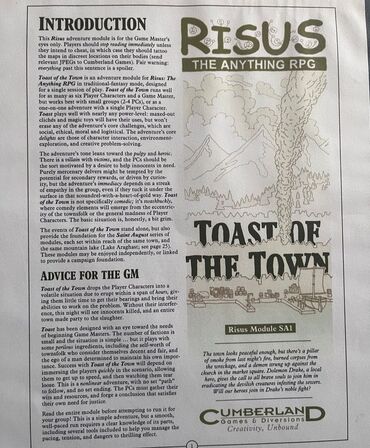 While the system is free, I have purchased some material in PDF and put them in binder because of its excellence. While the system is free, I have purchased some material in PDF and put them in binder because of its excellence. RISUS: OK, this is a d6 "dice pool" system that is free and has two pages of rules. I love it! I have run a couple of campaigns in this system, modifying rules as we go. Set up is fast--or can be--and is best when the players are willing to be goofy. The character development process involves selecting a "type" from literature, film, or whatever and then running with it. You have to convince the person running the game that your--for example--"Failed Han Solo 4" should be able to roll all four of his dice to swing across a river, charm a local constable or--less likely--defuse a bomb. Many people think this makes a good starter game. It has very few rules, right? I do not think it does. It is great for people who want to stretch the rules to their breaking point, improv, and roleplay. That, however, takes a certain amount of experience with the genre. Most beginners are trying to learn not just what is written down but the unwritten skills to bring life to their character and the world. Also, not everyone likes improv or understands the same tropes of popular culture. In my experience of teaching these games, true beginners are very focused on a strict reading of the rules. It takes a while to let them breathe. What it is good for, though, is a group who isn't taking things too seriously, knows how to play an RPG in general, and can keep focused long enough to "yes and" (that is...improv) well. This thing can go way off the tracks and people checking out for long periods of time is more detrimental than it is in other systems with, you know...structure. I will play this again some day. However, I will be careful about who I invite to the table. Welcome to the Risusverse! 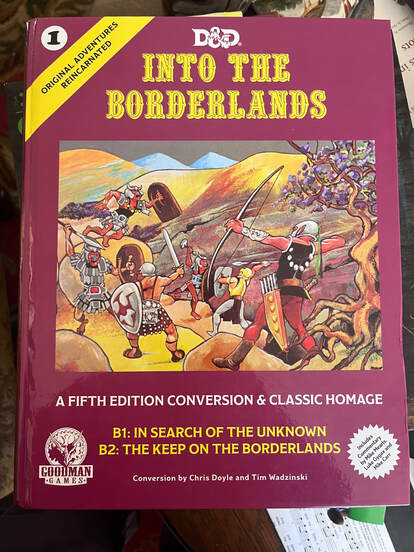 This Goodman Games product has two original modules from Basic D&D and a 5e conversion. They had a deal with WoTC but...apparently WoTC wants more... This Goodman Games product has two original modules from Basic D&D and a 5e conversion. They had a deal with WoTC but...apparently WoTC wants more... Finally "Original D&D": I use this term advisedly and really to shock my fellow nerds. There are plenty of people who see those words and prepare to fight! However, what I mean here is the cloud of games that have been developed under the banner of "Old School Renaissance (or Revival)." OSR games are designed to replicate many of the earliest roleplaying games. Honestly I haven't played many of the new OSR adaptations, but this is because I have my original Basic rules (above). These are the systems from the 1980's that I grew up with. They are unwieldy, complicated, and sometimes hard to learn. I started gaming around the age of 11. At first, of course, it was mostly just reading the rules and wishing my friends weren't trying so hard to be cool. Gaming was not cool. Parents saw it as being a gateway to drugs, cults, and satanism. At the very least, to be even interested in playing made you a weirdo. It was hard to get a game together and eventually--in high school--I gave up trying for a long time. I was still considered a weirdo, though. I probably should have kept on keeping on. The first books I bought were for what was just then beginning to be called "Basic/Expert D&D." Shortly before I began playing it was just called Dungeons and Dragons but a new version of the game came out called "Advanced D&D." Advanced D&D was similar to Basic but was ostensibly written by one person...Gary Gygax. "AD&D" is what WoTC now calls "First Edition." Why is Basic not "first" even though it is older and all the other d20 games are built upon it? Well Padwan, it is because Gygax didn't want to share profits with his colleagues. Sound familiar? It should. Also, it is unclear who owns this game today. It is that old and was abandoned by the poorly run TSR. This makes it hard to monetize if you are WoTC. Anyway, in a sense when I play a d20 game I am still playing Basic/Expert D&D. All those other books published by various editions and third-party folks? They are supplements to this game in my head, starting with AD&D. Looking back I realized that we just fused on parts we liked to our existing rules, but were never "first edition" players. It was way too complex! It probably annoys people I play with when I resurrect some random rule, or just make one up. Making up rules was a regular occurrence in the old game because the books were so poorly laid out it was easier just to wing it. This is probably why I like RISUS! When I run a game--in any system--I still do this. When someone else is running the game and I am playing, though, I do try--sometimes successfully--to make sure I have a reasonable grasp of what the system demands. Making up rules on the fly is definitely not everyone's way to game. Still...on the inside...I am probably playing something else. The game played very differently back in the 1980's. Modern games have long story arcs and heroes who are hard to kill so that those arcs can be maintained. Characters die fast and frequently in old D&D. The humor is broad. Survival is optional. You try not to get too invested in the backstory of who you are playing. Your characters are like you. They are way outclassed. That said, we loved exploring imagined worlds, gaining gold, and sometimes becoming heroes. We also brought backups. Sometimes when our character died we would erase the name at the top and then, in the next room, the party would find that character's identical twin sister. We drank Polar Soda, or Moxie, or Coke and always had chips and pretzels. We had no idea what we were doing. We were full GenX. Sometimes it was D&D. Sometimes it was something similarly deadly but much more complicated (d100 systems anyone?). The vibe was the same. Each table was basically playing a game of its own making developed through days of micro-negotiation. This, my friends, is what those Stranger Things kids were playing. There are a ton of options here, but I will start by suggesting Dungeon Crawl Classics by Goodman Games. I have used some of their material for my Basic/Expert explorations and other gamers I know like them. One thing to look out for is that some conservative folks gravitate to these older games because they don't particularly like the inclusiveness of newer games. This has given this genre a bad reputation in some quarters. It should be noted that "new OSRs" are frequently just as inclusive as newer games. It is just good to be forewarned when delving in to this area, particularly if you are hanging out on the socials. Also, nepotism is a thing so here is my son's old school weblog...or it will be here once he gets back to me. 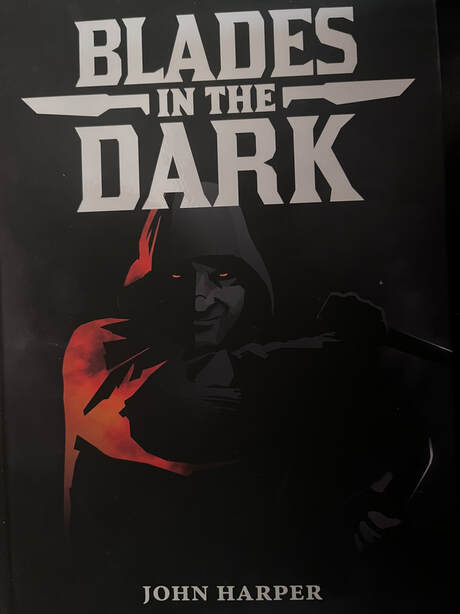 If there were six games on my list...this would be number 6 If there were six games on my list...this would be number 6 Anyway, there are so many more games I could mention. Some are dead. Others I just wish I had time for. There is a world of roleplaying games out there. There are also "story games." There are also board games that feel like roleplaying games, too. Although those mean buying from Hasbro. Tabletop RPG's have been an important part of the lives of many people. They have been a way to imagine another world. Sometimes that world is dark and sometimes it isn't. Whatever or wherever it is, we can try on different identities and different lives, which is just what we need sometimes. My social algorithms are full of consultants talking very seriously about how "play" can increase productivity. It probably does...I guess. What I know is that no one needs an uptight suit to tell them that these games can increase your creativity and, therefore, your happiness. So get out there and roll some dice! Good luck finding something. I am here to help.
0 Comments
Leave a Reply. |
Adam Tierney-EliotI am a full-time pastor in a small, progressive church in Massachusetts. This blog is about the non-church things I do to find spiritual sustenance. Archives
June 2024
Categories
All
|
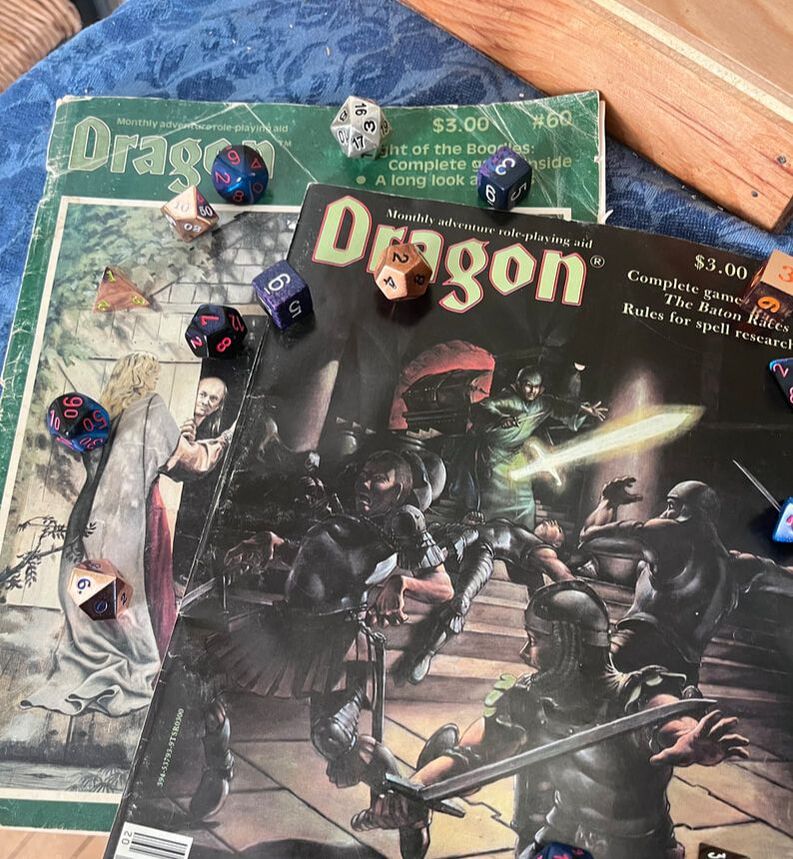
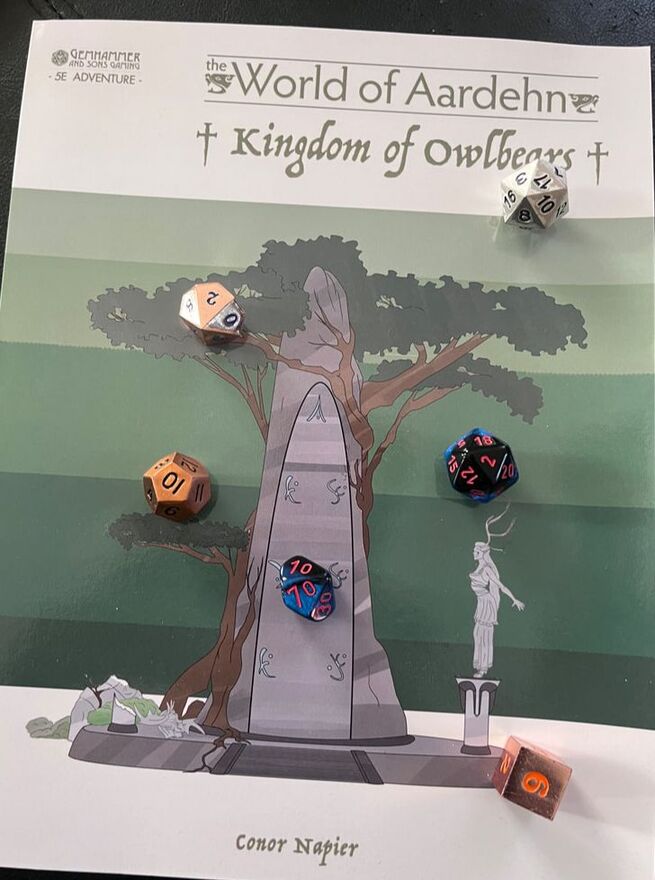
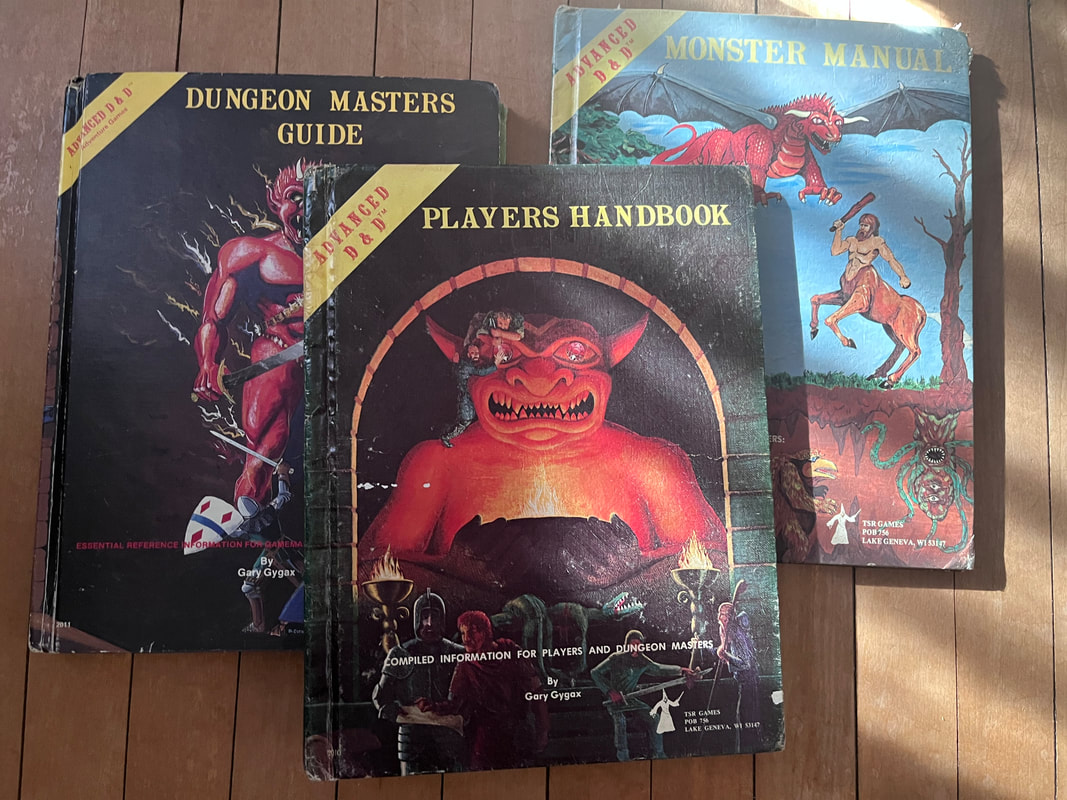
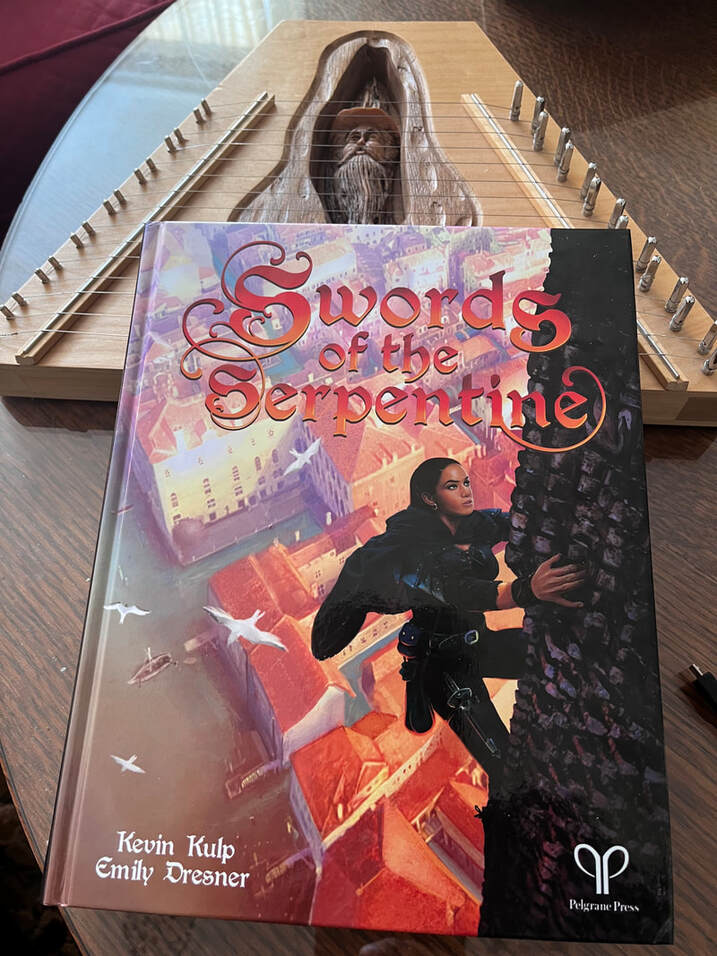
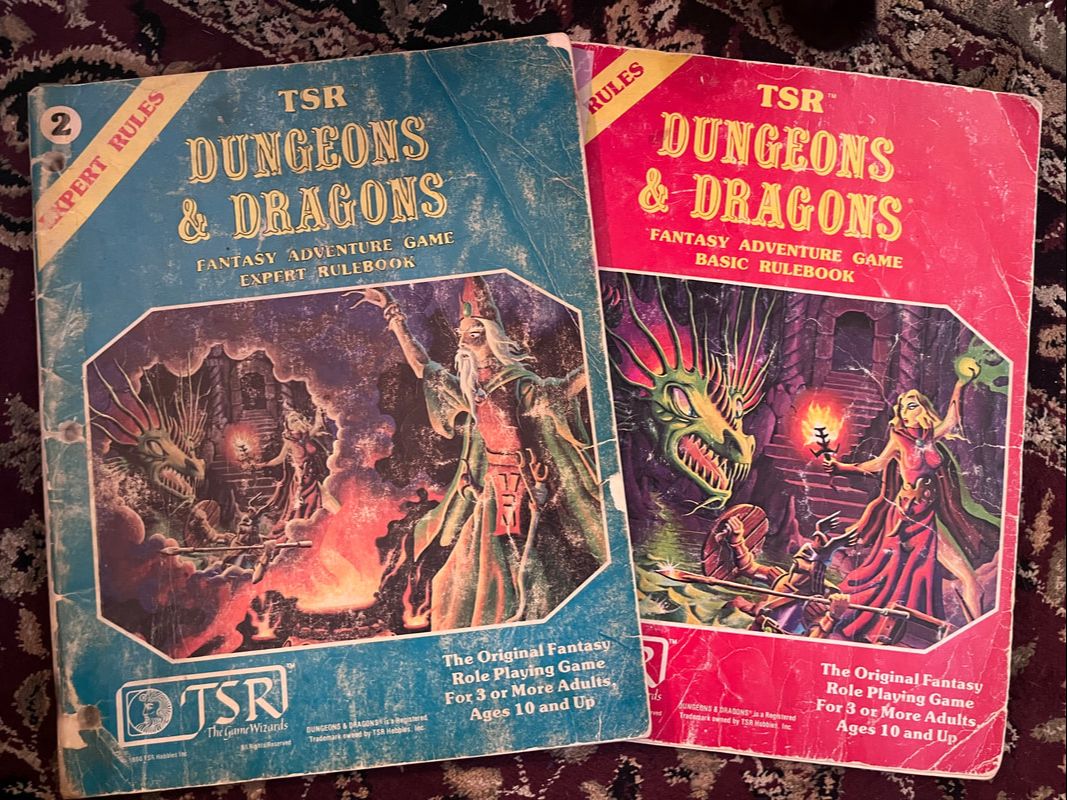
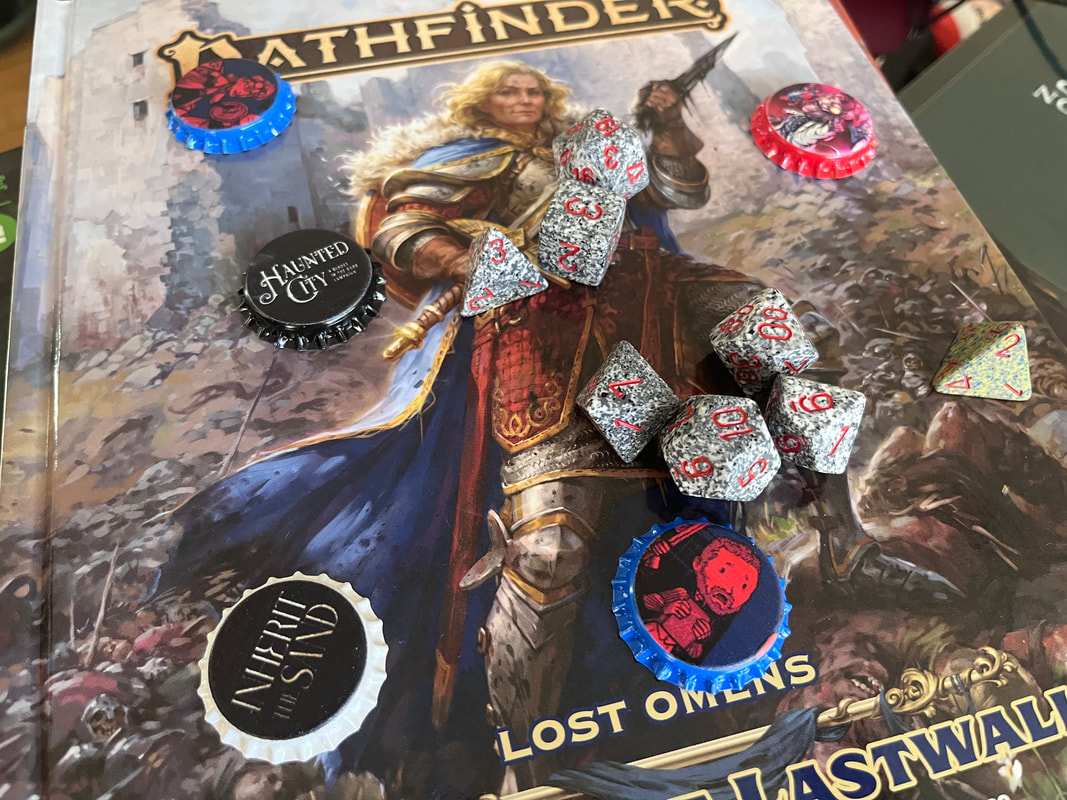
 RSS Feed
RSS Feed